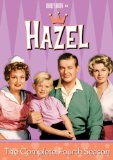| Reviews & Columns |
|
Reviews DVD TV on DVD Blu-ray 4K UHD International DVDs In Theaters Reviews by Studio Video Games Features Collector Series DVDs Easter Egg Database Interviews DVD Talk Radio Feature Articles Columns Anime Talk DVD Savant Horror DVDs The M.O.D. Squad Art House HD Talk Silent DVD
|
DVD Talk Forum |
|
|
| Resources |
|
DVD Price Search Customer Service #'s RCE Info Links |
|
Columns
|
|
|
Hazel: The Complete Fourth Season
"Call me 'Hazel,' 'Miss Burke,' or, 'Hey, you.' But don't call me 'comrade'!"
Hazel's running out of steam.... Shout! Factory has released Hazel: The Complete Fourth Season, a 4-disc, 26-episode collection of the venerable sitcom's 1964-1965 season―its last on NBC before moving for one final go-around over on CBS. America's favorite maid (or is that the Brady's Alice...or the Jefferson's Florence?), as essayed by talented sweetie Shirley Booth, is always interesting to watch...but season two's heart and season three's laughs have faded somewhat in the Biz® of Hazel's morning laundry chores, leaving behind a pleasant, but noticeably lesser collection of episodes. No extras for these back-and-forth color transfers.
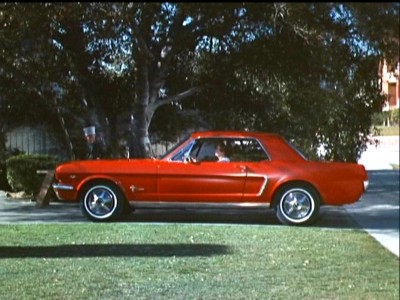
In a small, well-heeled suburban New York State town, live-in maid Hazel (Shirley Booth) runs the show at the Baxter residence. Nominal lady-of-the-house Dorothy "Missy" Baxter (Whitney Blake), who has nothing to do with the actual keeping of the house, is an interior decorator who has a rather sumptuous work studio out back. Hazel was Dorothy's maid when she was a child, and now her own son, Harold (Bobby Buntrock), sees the kindly Hazel as a surrogate mother, as well. Man-of-the-house George Baxter (Don DeFore), an often harried lawyer with a prosperous local law firm, sees Hazel as anything but a warm-hearted maternal figure―at least until he cools down―as the two spark continuously over their battle to see who actually is in charge of the Baxter home. Hazel is deferential to George...up to a point, always calling him, "Mr. B." However, she also loves to gently razz him and get his goat over silly, small points concerning the running of the house, while invariably butting into his business affairs that he conducts in his office den―not in a mean-spirited way, but rather as an expression of her always-honest, upfront, no b.s. personality. This grates on the short-tempered George―as it would any successful late 50s, early 60s American suburban male who (incorrectly) believed he was the king of his own castle.
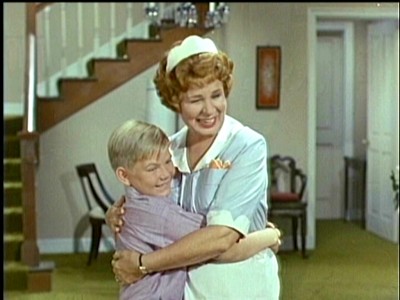
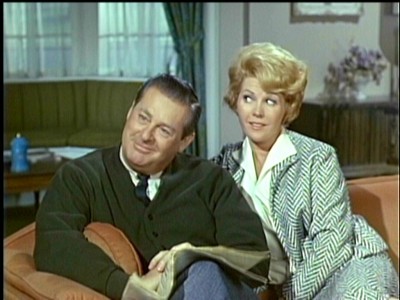
I've written two lengthy reviews of Hazel over the past year, so I'll try not cover the same ground here. A slight disappointment in terms of, if not "quality" then "depth," Hazel's third season is, as expected, professionally executed...but it lacks enough opportunities for the remarkable Booth to tug our heartstrings and/or put us on the floor, laughing. Small but nagging warning sign number one that this go-around was "off" came when the credit sequence for the season's first episode opened (featuring Hazel parking show sponsor Ford's flash-in-the-pan new auto for 1965...something called the Mustang), sporting a goofy new instrumental number that sounded like a thinly-veiled rip-off of The Flintstones' theme. Whose idea was that to get rid of the old bouncy, brassy theme that perfectly caught the flavor of Booth's performance as the bustling buttinski Hazel? When the producers start changing up the basics like theme songs, you know someone behind the scenes is worried about the show's direction (and ratings).
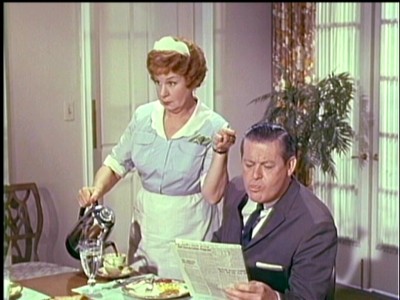
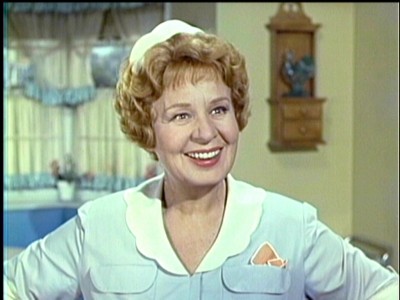
That indecisiveness of tone seems to be season four's biggest stumbling block. Episodes that should have scored solid laughs (or tears) just kind of...lay there, while we wonder when the season as a whole is going to pick up. The ingredients are present for episodes that could equal better efforts in previous seasons, but they're fewer and farther between, and necessarily more familiar through repetition. No wonder that by this point in the series, Booth was reportedly getting bored with Hazel; her special brand of come-rain-or-come-shine drama/comedy emoting was hardly getting stretched here (only one episode, Love 'Em and Leave 'Em, really lets Booth have a chance to break our hearts when she sees what's in store for her when little Harold finally pulls away). And the proof of that comes with the arrival of veteran supporting player Lauren Gilbert's arrival as George's playboy law partner, Harry Noll, consistently the season's funniest character. A player whom Missy finds "dear" and "romantic" (somebody couldn't come up with an episode based on that promising set-up? Just goes to show you how utterly disposable the producers thought Blake was by this point), Noll is a liar and sponger whom George barely tolerates. But due to the expert playing by smoothie Gilbert (his guilty little reaction shots when he's caught doing something naughty are priceless), Noll's creep lawyer comes over as impish and charming. When the best gags and situations start being thrown to supporting players, you know the writers are getting bored with the central character (just ask Mary Tyler Moore).
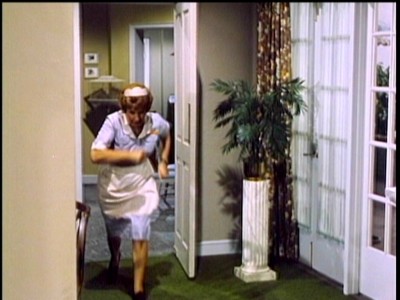
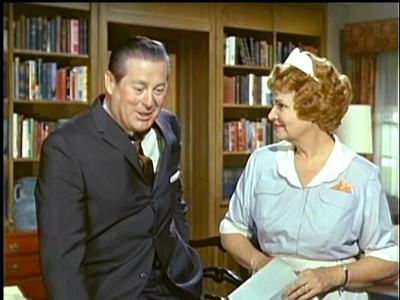
Amusing (but not hilarious) episodes can always be found here; Hazel may be on autopilot at this point, but it's too professional and competent not to be frequently humorous. I'm already laughing the minute I see Howard Smith as troublesome client Harvey Griffin, and he gets a funny foil in Maurice Manson's aggressively dislikable businessman Josh Egan, in Ain't That a Knee Slapper? (I hit the floor when childlike Smith moans, "I'm lonely, Baxter!" when he calls George, sniffing around for one of Hazel's home-cooked meals). It's a Dog's Life has simple but effective gags when Hazel has to baby-sit a pampered dog (Booth's pretty funny barking at the dog). Mayberry's Paul Hartman shows up and expertly essays a dense pest in George's Man Friday, a good showcase for the funny, talented Hartman. However, for every one of these laugh-getters, there's a misfire waiting to happen, including Welcome Back, Kevin (why is Hazel trying to fix gloomy Michael Callan's marriage?), Mind Your Own Business (which should have been a knock-out, with Smith instigating a war at home between Hazel and George), To Build or Not to Build (another seemingly fool-proof set-up―an expensive kitchen remodel―that delivers a paltry number of laughs), and the criminally underdeveloped High Finance Hits a New Low, with my all-time favorites, the daffy Johnsons, so beautifully played by Norma Varden and Donald Foster (in the episode's only worthy moment, Foster considerately turns his piggy bank's face away from the upcoming slaughter before smashing him to pieces with a hammer, crying, "que sera, sera!" Classic). When the laughs to chuckles to half-smiles quotient becomes balanced, you've got a series petering out.
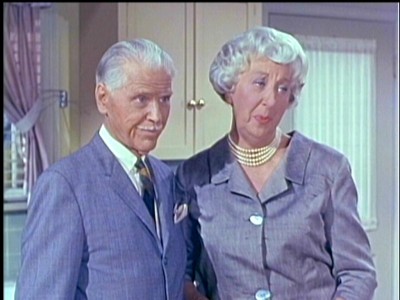
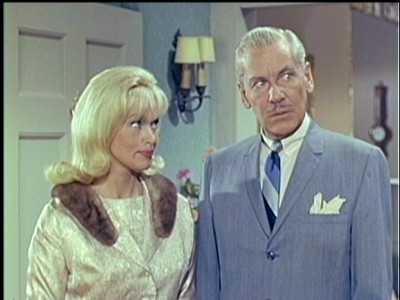
As with any show from this time period of network monopoly, if the laughs aren't coming in strong enough, you can always find interest in seeing how some of the episodes' subtexts get mangled (or glossed over) within the structure of this kind of sitcom's super-safe context. In Never Trouble Trouble, George's deadbeat dreamer cousin Frederic Downs eventually discovers that the key to true happiness in 1965 America is a steady job, learned at the hands of George's rather vicious humiliation of him when George denies Downs another handout (hey, it beats welfare). George's admirable distaste for the commercialization of Christmas in Just 86 Shopping Minutes to Christmas (check out a big network series like Hazel turning up its nose at blaring, hawking TV commercials) is rendered ridiculously hypocritical when he winds up buying his wife a mink coat. Even more startling is the emergence of the counter-culture for gods sake this season, when in Luncheon with the Governor, some college kids―yes, two of them are actually black!―picket outside George's house, when he hosts a luncheon for the visiting politician (relax, kids, these polite malcontents aren't hippies or commie revolutionaries; they're preppy, strait-laced, married couples who make The New Christie Minstrels look like The Rolling Stones).
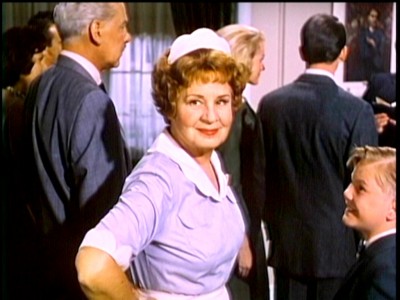
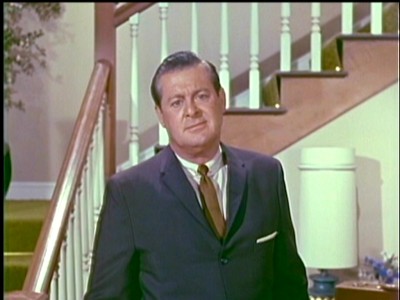
A momentary blip of uncomfortable, sad reality surfaces in Hazel Squares the Triangle when George's brother-in-law (the excellent Robert P. Lieb), pushed too far by controlling, dismissive Cathy Lewis (equally good), quietly and firmly tells her in front of the Baxters that he's finally had enough of her, and he wants a divorce. When later he confesses that, due to the stress and anxiety inherent in his fast-paced job, he's tired to think or feel anymore, you wonder just what the hell kind of Hazel episode you're watching (and wishing you could see many more of them). Best of all, though, is A Lesson in Diplomacy, a ridiculously-plotted Cold War episode that has the Baxters unwittingly becoming test fodder for a phony "visiting" Commie thug, played with relish by pro Oskar Homolka. Refreshing to say the least in its aggressive distaste for the bolshies (in these jaw-dropping times of our own open love affair with socialism), A Lesson in Diplomacy's script by John McGreevy has lots of funny asides about hypocritical communists (my favorite is Homolka bad-mouthing Thanksgiving...as he loads up his holiday plate). But its message is still potent: free speech is (or sadly used to be) our strongest weapon against tyranny. And when it's employed by a sassy, no-nonsense, kind-hearted, 100% American borscht-serving temptress like Hazel, its effect is...well, it's funny, at least.
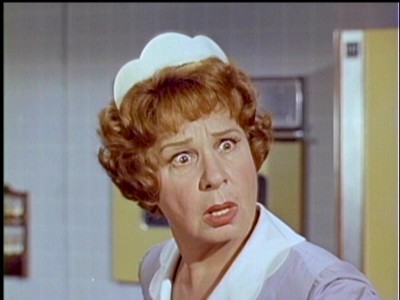
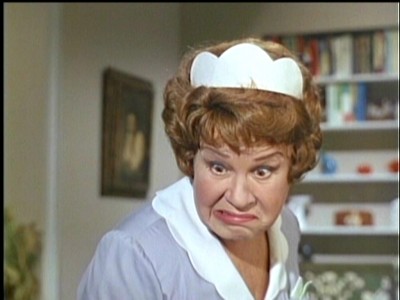
What wasn't funny was newcomer Peyton Place. ABC, killing in the youthful demographics the TV advertisers were increasingly seeking, decided to bring daytime soaps into primetime by greenlighting a twice-weekly adaptation of Grace Metalious' monster best seller. Premiering this 1964-1965 season on Tuesdays and Thursdays (with the Thursday "cliffhanger" episode directly opposite Hazel), Peyton Place destroyed Hazel in the ratings, with the Thursday entry landing 9th for the year on the Nielsen's, and kicking Hazel out of the Top Thirty (there was no competition from CBS's big disaster, The Baileys of Balboa). NBC cut their losses and canceled the show, but Hazel had one last season over on CBS...minus two big cast members....
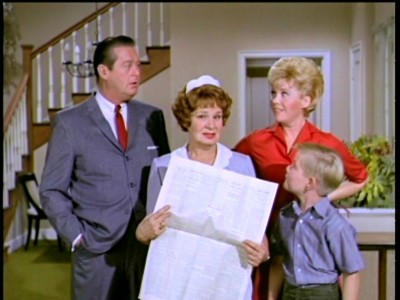
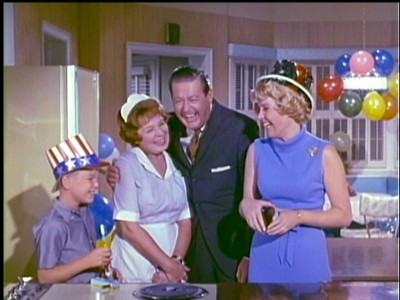
The DVD:
The Video:
As with Season two and three, the transfers for Hazel: The Complete Fourth Season are all over the place; many have iffy, washed-out or outright pink/yellowish color and blurry images reminiscent of bad VHS dupes, while an episode like Never Trouble Trouble looks fairly clean with good color. Shout! states these are the best available materials for the transfers, so....
The Audio:
The English split mono audio tracks are okay, with fluctuation levels at times, and noticeable hiss here and there (and prints where the laugh may or may not be present...mostly not).
The Extras:
No extras for Hazel: The Complete Fourth Season.
Final Thoughts:
Amusing...but just. Not enough Shirley Booth doing what she does best: make us tear up from laughter and heartache. About an even mix of good to middling to only fair episodes...and that's not a good thing. I'm recommending Hazel: The Complete Fourth Season, but only for committed fans.
Paul Mavis is an internationally published film and television historian, a member of the Online Film Critics Society, and the author of The Espionage Filmography.


|
| Popular Reviews |
| Sponsored Links |
|
|
| Sponsored Links |
|
|
| Release List | Reviews | Shop | Newsletter | Forum | DVD Giveaways | Blu-Ray | Advertise |
|
Copyright 2024 DVDTalk.com All Rights Reserved. Legal Info, Privacy Policy, Terms of Use,
Manage Preferences,
Your Privacy Choices | |||||||









